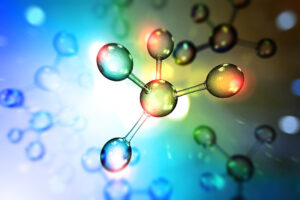In order to fully understand the true benefits of CBD products, it is important to understand the endocannabinoid system, also known as ECS. This intricate system is located in the brain, nerve cells, immune system, and other places throughout the body and every human has one (regardless of whether you use CBD products or not). The ECS plays many important roles in the body but ultimately it functions to maintain balance. By responding to stressors and helping the body regulate across multiple systems, a healthy and fully functioning ECS can help the body achieve function optimally.
The ECS is still not fully understood and expert scientists continue to investigate its properties, but what we do know is that the ECS plays a role in regulating many of the body’s essential functions including sleep, mood, appetite, memory, and reproductive health.

How does the ECS work?
When the ECS detects the need for action, it begins working to restore balance. For example, if your nerves detect a physiological change such as blood sugar or body temperature change, your body’s internally-produced endocannabinoids bind to receptors that communicate this information to the ECS.
This signal tells the ECS that it is time to act; therefore, it activates to help adjust the body to the changing environment and to help regulate and maintain a normal optimal state of health and function.
Components of the ECS
This complex system can be broken down into three main components:
- Endocannabinoids
- The Nervous System
- Enzymes
Endocannabinoids
Endocannabinoids are compounds found in the body that interact with the endocannabinoid system to help prompt reactions to changing internal and external environments. Similar to the cannabinoids found in hemp plants, the only real difference is that endocannabinoids are produced by your body. These powerful chemicals work with nervous system receptors to promote balance. You might also hear endocannabinoids referred to as “endogenous cannabinoids.”
There are two main endocannabinoids that scientists have been able to identify thus far: anandamide (AEA) and 2-arachidonoylglycerol (2-Ag). Endocannabinoids are produced on an “as needed” basis by the body.
“Phytocannabinoid” is the name given to the cannabinoids that are found in cannabis and hemp plants.
The Nervous System
The ECS contains central receptors within the brain and peripheral receptors in nerve cells that work with the nervous system to communicate with body systems and help the body adjust to a changing environment. The two main receptors of the endocannabinoid system are CB1 and CB2.
CB1 and CB2 respond to cannabinoids and carry the body’s naturally occurring endocannabinoids. These receptors are found all over the body.
CB1 receptors mainly affect the brain and central nervous system while CB2 receptors affect the peripheral nervous system, immune cells, and microglial cells of the brain.
CBD works by blocking the CB1 and CB2 receptors. This prevents the overactivity of neural cells and helps excite neuroplasticity (brain reorganization). This blocking of CB1 receptors also prevents over-excitation of the brain which might influence the feeling of calmness that CBD users often report. When CBD blocks CB2 receptors, this triggers various immune cells to perform at proper levels.
Enzymes
The ECS also contains vital enzymes that help break down cannabinoids and other compounds to help the body function optimally. Once endocannabinoids have carried out their needed function, enzymes are responsible for breaking them down.
Two main enzymes in the ECS have been identified:
- Fatty acid amide hydrolase
- Monoacylglycerol acid lipase
CBD oil works closely with these enzymes to keep the ECS functioning optimally by serving as a decoy for these enzymes to allow the endocannabinoids to hang around longer.
Which body parts are affected by the ECS?
Different bodily functions and processes are affected by the respective receptors of the ECS. This system is still being researched and is not fully understood by scientists yet, but its processes have been linked to some important functions such as appetite, metabolism, regulation of healthy inflammatory levels, modulation of occasional aches and pains, memory, and mood. All of these processes contribute to achieving balance, which is the overall goal of the ECS.
Body parts affected by CB1
CB1 receptors help regulate over-excitation in the brain, helping regulate mood, pain signaling, and memory. Body parts supported by CB1 include the brain, lungs, cardiovascular system, muscles, and reproductive system.
Body parts affected by CB2
Associated with regulating optimal inflammatory function and immune function, CB2 receptors are very powerful and important. The body parts affected by CB2 receptors include the intestines, immune system, bones, and spleen.
Why take CBD for ECS support?
The fact that we all have an ECS inside of our bodies to regulate and support balance is miraculous, but this system is almost always under the pressure of various daily or occasional stressors. You may not be surprised to hear that your mind and body is constantly under stress as you move through life — go figure. This makes maintaining balance a bit of a challenge for our bodies. Any additional support for the ECS can help maintain that balance we all so desperately need.
How does CBD oil work with the ECS?
The exact details on how CBD works inside of the ECS are still up for debate, but some experts have figured out that CBD works much differently than THC does. Two important processes associated with how CBD works with the ECS are the following:
- CBD binds to enzymes that degrade endocannabinoids
- CBD binds with fatty acids that carry endocannabinoids
These two processes play a big role in CBD’s benefits and effectiveness. By binding to enzymes that would normally break down the body’s natural reserve of endocannabinoids, CBD allows for a more abundant supply of cannabinoids to exist in the body. Binding with fatty acids that carry endocannabinoids allows for more of the body’s endocannabinoids to release and used.
Overall, the endocannabinoid system is an intricate part of our body’s natural ability to maintain balance and adapt to stress. This system has multiple components and works closely with CBD products to benefit individuals in a number of ways. Understanding the ECS and finding the best CBD products to help your ECS function optimally may be your next step toward overall wellness.
CBD Health Collection prides itself on producing the finest quality products in the industry. We invite you to shop all CBD products here.


